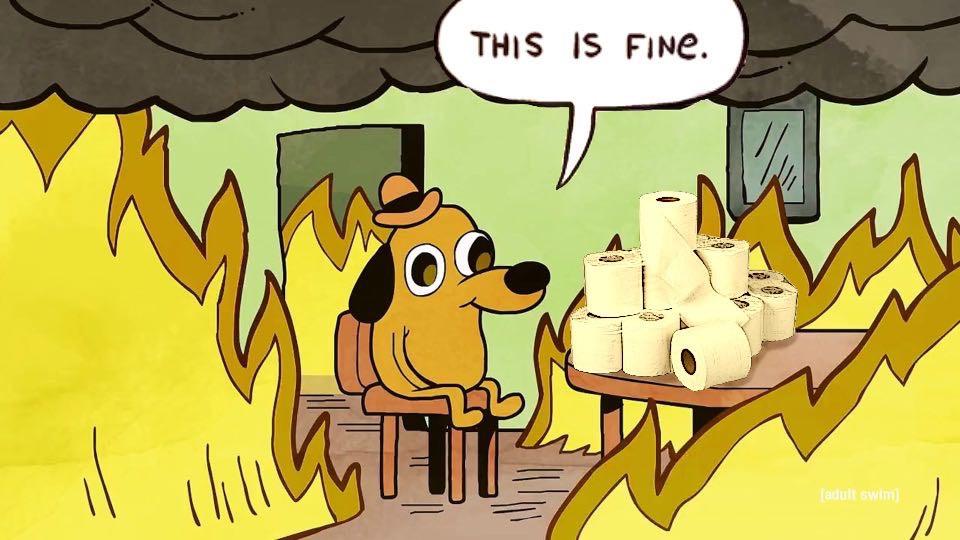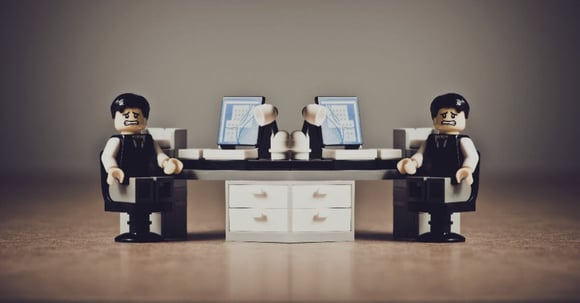Get an employee's real story of being away from office over two months. Here's what managers should expect, when employees return after COVID-19 shutdown.
When employees return after COVID-19, what do you do? We asked an anonymous Copenhagen-based employee to share his story. Read it below and get his tips and thoughts on what you as a manager should prepare for.
2020 surely went nuts, that’s no understatement. I was sent home from work for two and a half months as part of a government salary compensation package. Here’s my story of how it was, and how it’s like to start up again after the period.
What went through me during this period?
Basically, I went through 4 different stages:
- The Shutdown Shock stage
- The ‘I’m totally fine!’ stage
- The Reflective stage
- The Reboarding stage (currently ongoing)
The ‘Shutdown Shock’ stage
This stage started as I was sent home. I recall it as a shock because I was confused, uncertain and anxious. It wasn’t shock as you know it from car accidents, hospitalization and grief as such.
However, there was a mental state of confusion and uncertainty. Instantly, my professional everyday was ripped from me along with a great deal of routines and social encounters. I underestimated how distressed you actually can become losing this, since so much of my future is on stake here.
The beginning was weird. There were no duties, no arrangements, no routines. This would later cause sleep deprivation, demotivation and moody reactions. On the other hand, I felt safe thanks to the actions my company and the government took. But I had to accept being in the unknown and more alone – like everyone else.
The ‘I’m totally fine!’ Stage
No I wasn’t. As the shutdown shock calmed, my eager to stay positive, and to adapt and prepare for the future, took over. I wanted to stop worry, focus on what I could control, and stay engaged, social and active. I went too much ahead in this. Stress signals still stepped in, I had moody reactions, sleep deprivation still ongoing, and there was only a limited things you could change or built in your home. It was hard creating new habits and routines during a time of chaos.

I think I tried too hard to positively adapt, because I wanted to keep vulnerability and worries on a distance. Moving too quick worsen your chance of keeping it up sometimes, and then the worries catch up. Maybe that shock wasn’t really over.
The reflective stage
In this stage, I became more settled, and it was a thoughtful period. I got so many ideas and new knowledge, and that prepared me to professionally see my work and company from helicopter-perspective. I was still tired though, and I still had that constant feeling of being powerless.
Communication from work made all the difference though, and it paved way to get more ‘brain space’ to do creative and inspiring things. When my manager called to check on me, every time the conversation started with a “how are you?”, followed by a genuine interest, and a chance to get a comic relief. A phone call like this might not seem like a big deal, but trust me it is.
This stage was the most productive and full-filling part of being off work. I followed my professional passion and upskilling. It was a unique chance to take a step back and really think and learn. But experience is the greatest teacher. If you can’t practice it, you’ll easy forget it.
I think this stage could be a gold mine for managers to engage in. It’s a great chance to empower employees through sharing these new thoughts and skills – for better procedures or even results. It could be the most simple things – it doesn’t have to be a SpaceX project.
The reboarding stage
Imagine you jump off a ship while it’s sailing. All of a sudden you have to step off onto this boring little island and stay there some time – like Tom Hanks and his imaginary friend Wilson in Cast Away. Now it’s back to pick you up, and you have no idea where they went in the meantime! You are now reboarding the ship again. Here’s my experience of coming back.
I am really relieved to have my routines back and seeing people again. Thankfully, a plan was prepared that was as smooth as it could be in our situation. I got fairly easy up to date with information on important stuff, and I know where to access the knowledge, when I need to return to it. Also, what really do wonders in workplaces is a digital development plan for employees.
The challenges
However, although I wanted to blast into work and stay productive and engaged, I still had some aftermath from a long down-period described in the past stages. To sum up, these are the challenges I face more or less:
- Ability to focus
- Feeling overwhelmed and uncertain
- A huge desire to perform, but still burdened with sleep depriviation
I am surprised about how my ability to stay focused worsened. I thought I could jump back in right away, like a fueled machine. Now I’m in week two, and since my manager gave me time to get up to speed, the challenges above are fading away.
Regaining overview
While the reboarding plan helped me getting up to date in general, I still have my own projects, platforms, data, e-mails, and tasks as such, that management don’t consider (fairly enough). So I have to do some effort myself to regain overview.
The current economic situation creates urgency in many things I do. It’s not easy staying agile and adapt during a crisis like this. This is why I make an effort of planning with support of my manager, because continuous communication really matters to battle this. That way I am able to freely talk about how to realistically perform right now, get expectations straight, and get the support and time to re-establish myself.
What do I expect from my workplace and manager as I’ve returned?
As I returned, I knew I had to adapt to a lot of new demands. Naturally, it goes both ways, but in terms of how my long off-time has been, here are my 5 tips for managers to take into account.
1) Manager, please take care of yourself!
These times affects us all, so be sure to take care of yourself and your family. Especially if you really put in the hours now, a culture of flexibility may be more relevant now. If you don’t audit yourself you can’t help others.
2) Have a plan for the return – and remember to listen
Having a realistic plan for when employees return after COVID-19 is crucial. With that plan expectations are set. A path is more clear and concise. But be aware that any employee’s personality and situation can be different.
You need to listen to how employees are affected by this period, then you may be able to prevent people from being too stressed out in the beginning. Don’t expect employees to just come back ready to instantly take on a pile of workload you prepared.
A lot of employees really wants to perform and be highly engaged, when they actually need to start slower and take on less.
Read also: Tips for working remotely
3) Catch up on the good stuff! Empower your employees
I really urge leaders to dig into to this goldmine of new thoughts and ideas employees may have had during the time. What can we do differently, where should we invest more time, what are we missing in terms of adapting business to this new reality? Don’t underestimate that.
Your returning employees were forced to look at things on a distance and had more time to reflect on it (depending on family situation of course). Ongoing conversations about how we can change our work for the better are uplifting – and engaging at least. Now is the chance to create a learning culture that engage and empower people.
4) Keep up continuous support in the beginning
Remember that many things may have changed. New customers, new products, new procedures, changes in workforce, new battleplans, changed budgets or projects. Almost any company have quite some changes to introduce.
As an employee, I expect to have a continuous effort of communication to help me step back to the office and become effective again. I’m ready to do my part, but I need my manager’s support to succeed.
If it’s just a one hour meeting on the first day back, don’t expect your employees to remember everything. The essentials have to be re-communicated some times. Set the agenda.
5) Maintain proactive communication for wellbeing
As I came back to work, having an attentive leader asking questions that makes sure you are all set made a huge difference. If you really have my back, and you are present in our team with continous catch-ups, you actively contribute to keeping employees on the ’reboarding track’.
I am not at all saying you should pet people, but keep looking for signals that may need your attention – or maybe just a sanitized elbow-five for spirit. There’s an art to this, I think, because you want to avoid micro-management, especially when it suddenly is all about performance. Show trust and be there, when needed.
In the end, I don’t think the tips are news to many managers. But acting on it is really important, and it may even be more difficult to walk the talk these days, when employees return after COVID-19.
Read also: Fight COVID-19 - New Learning Flow
